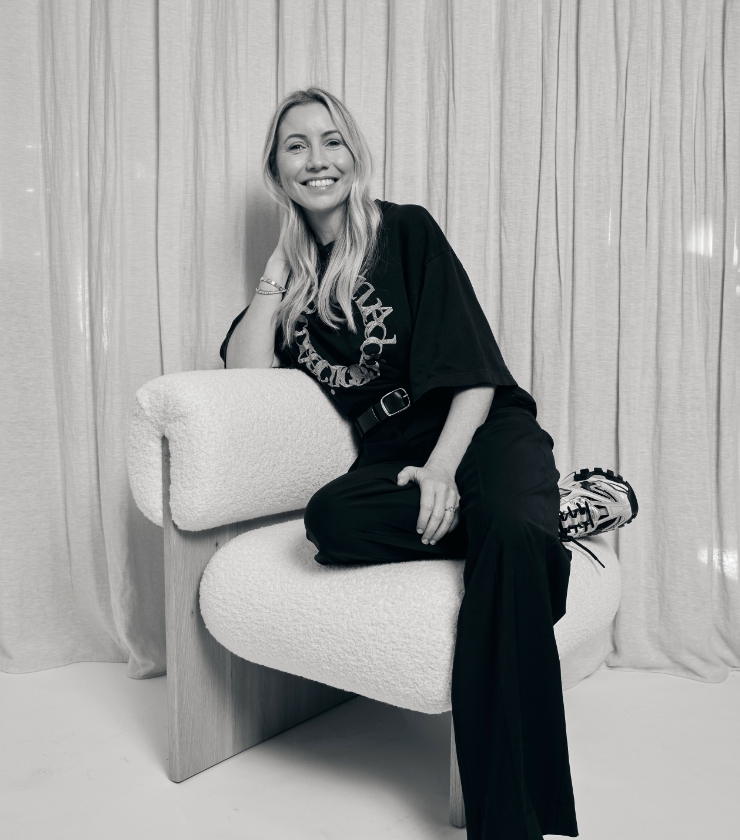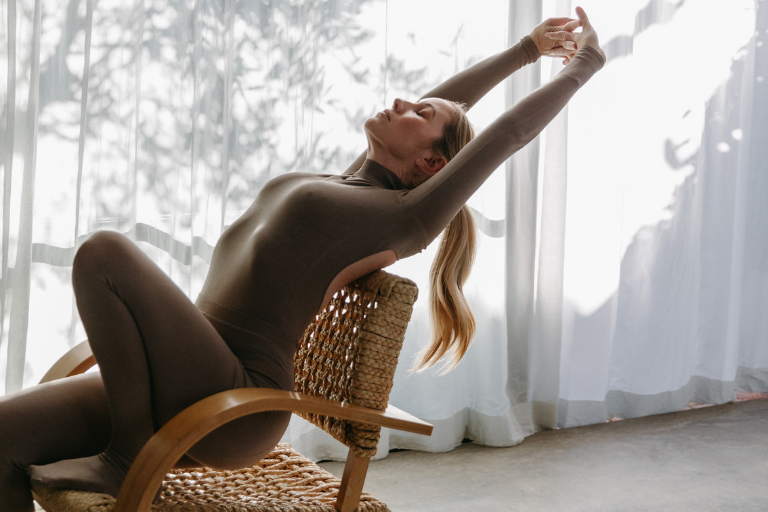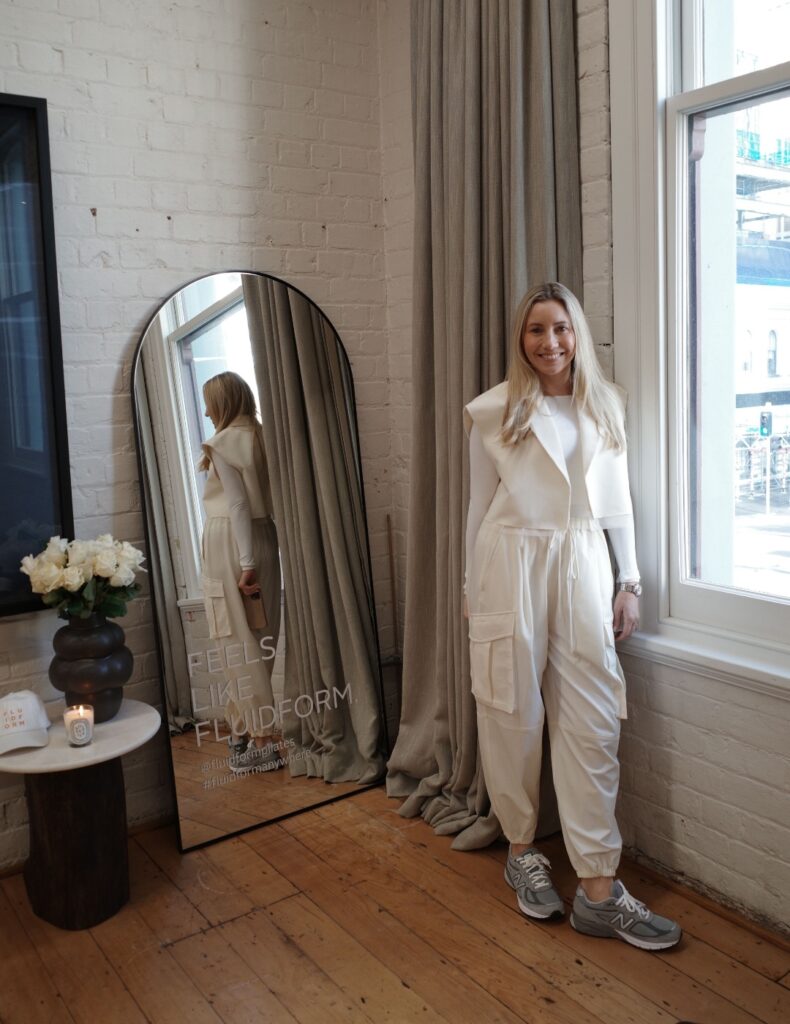
It’s not often I get to dedicate my morning to movement and clock it in as ‘work’ but as I made way through to a quiet corner of the libraries in Hotel Britomart with Fluidform founder Kirsten King – who had travelled from Sydney Australia to host a small series of events – little did I know that I was about have one of my most candid interviews yet with, for lack of a better phrase, my everyday hero. Energised with post-Pilates endorphins and the Fluidform x The Store ‘Wake Me Up’ smoothie, Kirsten’s voice was gentle, encouraging and identical to her digital persona of whom I’d become accustomed to when using the Fluidform at Home app. Like her workouts, the sentiment of our conversation was efficient and effective.
As someone who has struggled with consistency, taken an all-or-nothing approach, and – more recently – been diagnosed with a hormone disorder, my views towards my changing body ebbing with the flows and frictions of modern life have had an adverse affect on my fitness regime. From addressing stress, hitting plateaus, and loving the parts of ourselves which we’ve grown to despise, I came away from our conversation with a series of helpful insights that can help and inspire your own wellness journey. Below, I recount Kirsten’s sage advice.
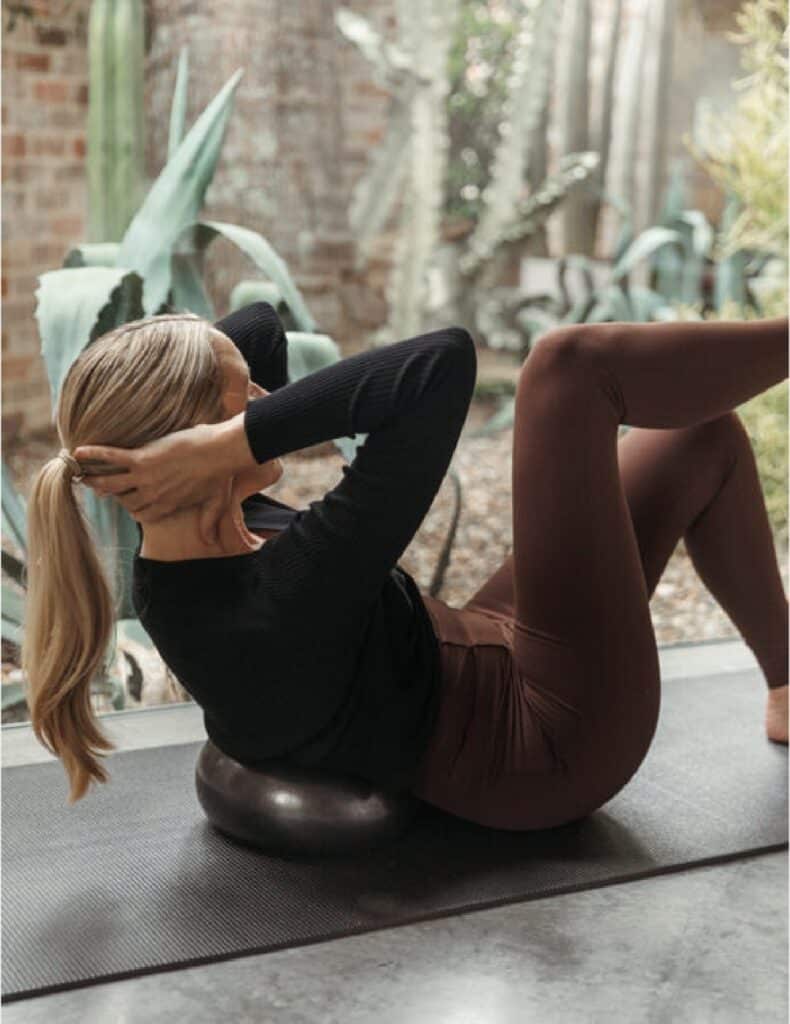
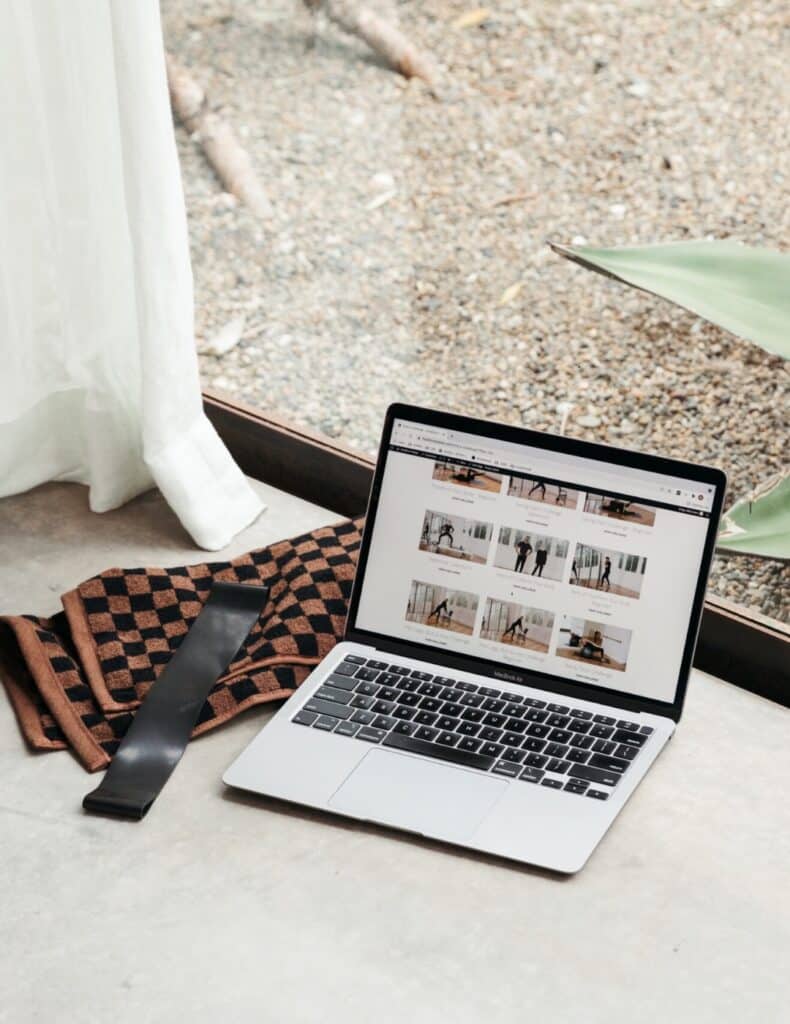
It’s a common misconception that you need to work harder when you’re stressed
It’s not unusual to hit the pavement or the weights room to blow off steam. But if you’re routinely stressed in your day-to-day, this approach can do more harm than good.
“In our busy lives when we’re trying to blow off steam and get that nervous energy out of our system, there is that mentality that you need to go and flog your body,” says King.
“If you break it down and think about that, what you’re doing is creating more tension, stress, and continuing to build that feeling in your body, whereas what you should really be looking for is the opposite of how you’re feeling and what you’ve been doing.
“Pilates is about taking that time to rebalance the body not only from a muscular point of view but from a mind point of view. You don’t need to continue to keep your cortisol levels raised, which high intensity workouts can do.”
Pilates is a moving meditation that can help relieve stress, trauma and anxiety
At the core of Kirsten’s Fluidform method is improving the lives of others by balancing the human body to move freely and efficiently with confidence. In order to do that, however, it requires giving in to the process and opening up. During our conversation, Kirsten revealed that it’s not uncommon for her clients to experience an emotional release during her workouts.
“The stretching and mobilisation movements of the joints before the stabilisation and the strength work allows any tension and any trauma that’s trapped inside your body to be released,” she says.
“It’s not uncommon for people to weep or cry in a Pilates class because there’s blockages, trauma, and just ultimate fatigue from life. [It’s] that gentle movement, breathwork – everything combined – the holistic approach to movement and the release of good endorphins balances out the body and resets you.”
“I say to clients a lot ‘you need to give in to Pilates’. Don’t walk in with a preconceived idea of what it should be or what you should be achieving. Once you give in to it and move, and trust the method and the process, everything else falls into place.”
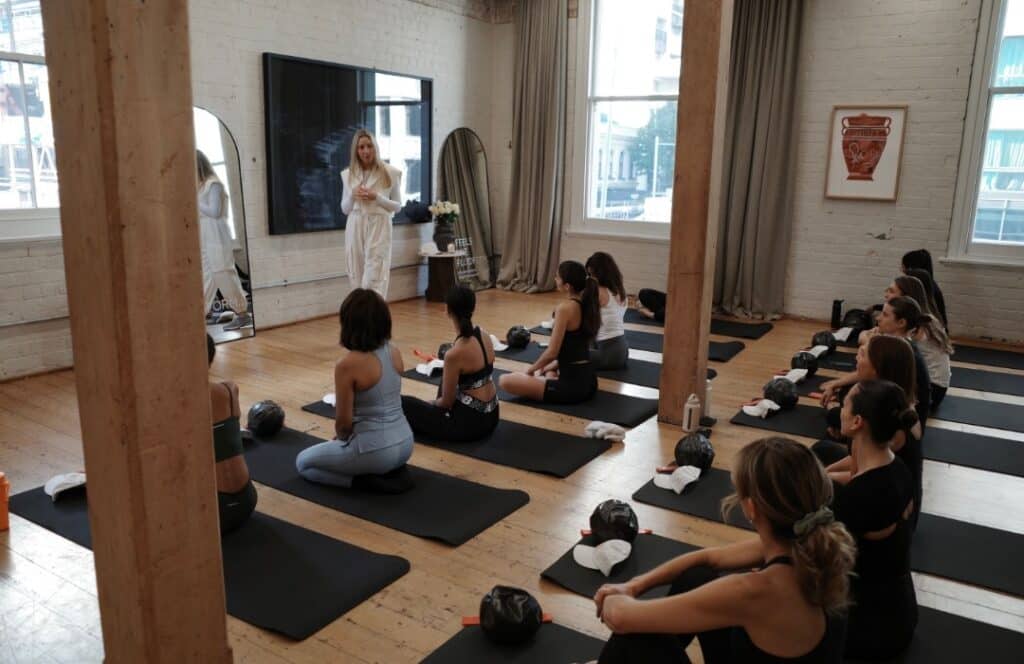
Love your scars first, and the improvements in your form will follow
With a range of workouts dedicated to prenatal and postnatal movement, Kirsten has worked with clients who have dissociated from parts of their bodies following pregnancy, more specifically caesarean surgery, and has found that overcoming a negative mindset will have the biggest impact on her clients.
“If you’re a mum, or a pregnant person who has gone into labour not wanting a C-section, there’s a big mentality and fear associated with it,” she explains. “The societal pressure ‘you’re too posh to push’, the ‘have I failed?’ and ‘was I unable to do what everyone else has done before me?’
“Women that haven’t chosen a caesarean go in and they get this beautiful baby and they just hormonally/postnatally hate on their body,” she explains. “They create this real blockage and trauma associated with the scar… they can’t look at it, they can’t touch it, the thought of touching it makes them quiver… They build this self-hate against themselves.
“What happens is that there’s no connection there. It becomes this numb platform… This blockage actually stops them from getting over the hurdle of having a caesarean in the first place.
“It’s so important to connect back into that area, to massage the scar, to feel that area again, to get the mind thinking about it again, about how amazing that area is, that’s where your baby came from. It’s beautiful, it’s strength, and it’s not something to be embarrassed about.”
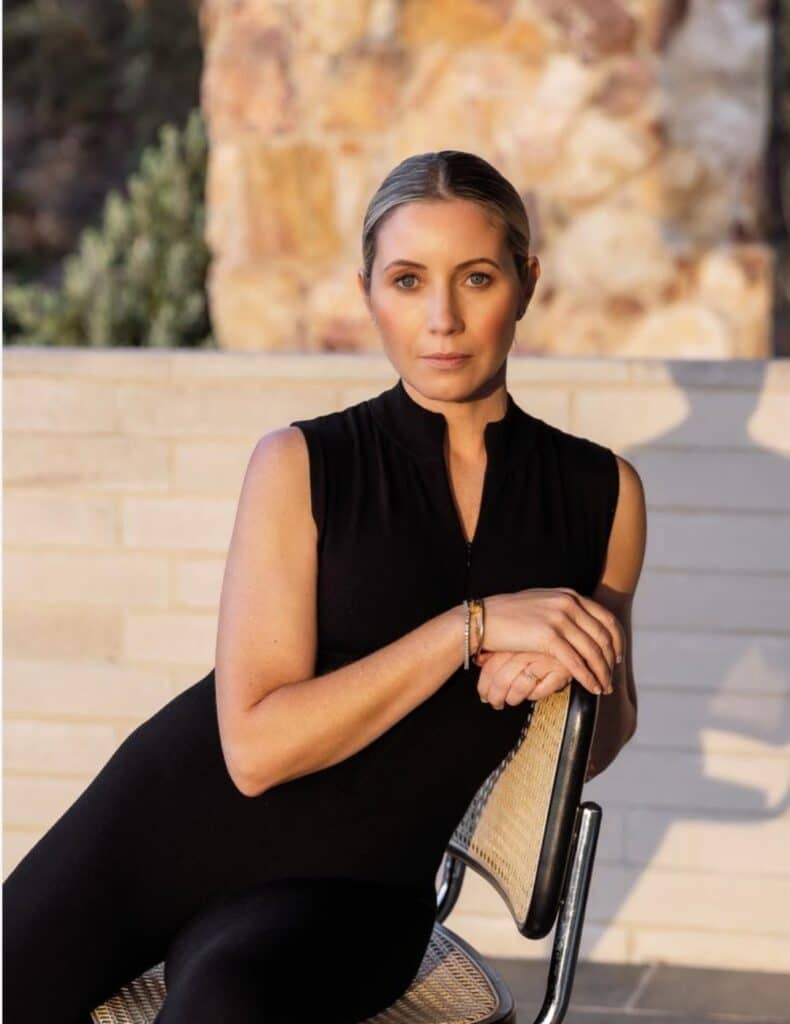

“Even if you’re doing the work, if you’re not mentally connecting with these areas of the body where you feel shame or embarrassment, it’s unlikely you’re going to see any change.”
You need to believe that your body can do it
Kirsten explains that in her studios, she’s 70% psychologist, 30% Pilates instructor, emphasising just how significant the role our mental strength plays in our physical form and how, symbiotically, movement is a form of mental health. Referring to the last 10km of a marathon or a tiebreak in tennis, it’s our mind that will finish the race or the game, not our body.
“Yes, you have to be fit, [but] it’s your mind that will finish the game. It’s like anything in life, you need to believe that your body can do it,” she says.
“We’ve seen it with clients where there is trauma or embarrassment with injury and they just can’t get past that area again. They might have fallen over drinking and broken their arm and then suddenly they can’t deal with that arm or hand. It begins to impact nerve impingement, muscle connection activation, and then suddenly you’ve got an arm that’s not functioning as it should.”
You should feel like you’re doing it for the first time, every time
On the topic of plateaus or not seeing progress, Kirsten believes that every day our body is different, and so long as we’re showing up on the mat and listening to our body, there will always be something to learn and to correct.
“Maybe you slept funny, maybe you went for a hike on the weekend, maybe you wore different shoes – you need to listen to your body. Listen to your instructor. You need to feel like you’re doing it for the first time, every time. If you approach it like that, you always continue to change and evolve,” she says.
When starting again, start small
“When you’re travelling or starting again, start small, and do what you love. Choose from your favourites – like your little black dress – or opt for a short 14 day challenge. Just get on the mat and begin,” she says.
“It’s like the phone call you need to make, or that email you need to send, the amount of energy we waste procrastinating sitting here thinking ‘should I do it?’ you would have already done it. Just lie down.”
“Movement is medicine. If you can start moving now and prioritise yourself, you’ll be feeling like you’ve never felt before: strong, empowered, confident, and just proud of yourself, and grateful for your healthy body that you’re in.”
Images: Supplied.


